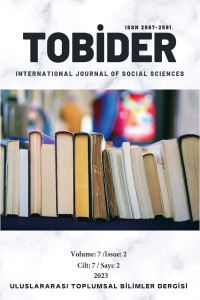Abstract
Vahdet-i vücûd düşünce sistemini savunanlar, tüm Kur’an-ı Kerim’i, vahdet-i vücûd nazarıyla okudukları için tüm ayetleri, bu ekolün düşüncesine birer argüman olarak kabul ederler. Ancak bu çalışmada, vahdet-i vücûd’a delil olarak gösterilen ve kaynaklık ettiği savunulan bir çok ayetten öne çıkanları ele alınıp incelenmiştir. Ve bu ayetlere, vücudun birliğini savunanların nasıl anlam verdiğine dair örnekler sunulmuştur. Bu nedenle, ayetlerin tefsirinde, siyasi, sosyal, yahut fıkhî boyutlar bir yana bırakılarak, tefsirlerdeki vahdet-i vücûd eksenindeki yorumlardan bazılarına yer verilmiştir.
“Vahdet-i vücûd” düşüncesine kaynaklık ettiği savunulan bazı ayetler ve onlara ilişkin özellikle İbn’ül Arabi ve onun ekolünden olan şârihlerin yorumu, bu düşünce sisteminin naslara dayandırılabileceğine dair incelikli deliller öne sürmektedir. Özellikle Ahmet Avni Konuk’un Füsus şerhinde yer verdiği ayetlerin yorumları öncelikli olmak üzere, öne çıkan ayetlerin nasıl vahdet-i vücût düşüncesi bağlamında temellendirildiğine örnekler verilmeye çalışılmıştır. Kuşkusuz, Kuran-ı Kerim’in tamamında yer alan ayetleri, vahdet-i vücûd nazarı ile okuyan vücûd ehli şârihleri, kutsal kitabın tüm ayetlerinde varlığın birliği düşüncesinin yansımalarını görmektedirler. Ancak biz bu çalışmamızda, söz konusu ayetler arasından en çok öne çıkan ve vahdet-i vücûd düşüncesini savunan kimselerce ilk olarak öne sürülen ayetleri ele almayı uygun gördük. Bu ayetlere dair, vahdet görüşünü benimseyen bir çok şârihin, işârî tefsirine yahut batınî yorumlarına yer vermeye çalıştık.
Keywords
References
- Afîfî, Ebu’l Alâ Afîfî Fususu’l Hikem Okumaları İçin Anahtar, çev. Ekrem Demirli, İz Yayıncılık, 2. Baskı, İstanbul 2002.
- Beki, Niyazi. Celal ve Cemal Sıfatları Işığında Rahman Suresi. İstanbul: Nesil Yayınları, 2003.
- Cebecioğlu, Ethem, Tasavvuf Terimleri Ve Deyimleri Sözlüğü, Anka Yayınevi, İstanbul 2005.
- En-Nablusi, Abdulgani. Gerçek Varlık. İstanbul, İz Yayıncılık, 2003.
- Eraydın, Selçuk. Tasavvuf Ve Tarikatlar. İstanbul Marmara Ünv. İlahiyat Fakültesi Vakfı Yayınları, 2004.
- Ertuğrul, İsmail Fenni. Vahdet-i Vücud ve Muhyiddin-i Arabi. İstanbul: Orhaniye Matbaası, 1928.
- Kâşâni, Abdürrezzak, Tasavvuf Sözlüğü,çev. Ekrem Demirli, İz Yayıncılık, İstanbul 2004.
- Konuk, Ahmed Avni. Fusûsu’l Hikem Tercüme Ve Şerhi. Haz. Mustafa Tahralı-Selçuk Eraydın. 4 Cilt. İstanbul: M.Ü. İlahiyat Fakültesi Yayınları, 2000.
- Konuk, Ahmed Avni. Tedbirat-ı İlahiye Tercüme Ve Şerhi. Haz. Mustafa Tahralı. İstanbul: İz Yayıncılık, 2004.
- Kur’an-ı Kerim Meâli, Hazırlayanlar: Halil Altuntaş, Muzaffer Şahin. Ankara: Diyanet İşleri Başkanlığı Yayınları, 2011.
- Muhyiddin İbn’ül Arabi. Fusus’ül Hikem, çev. Nuri Gençosman. İstanbul: İstanbul Kitabevi, 1971.
- Semerkandi, Kemaleddin Abdürrezzak Kâşâni. Te’vilât-ı Kâşâniyye. terc. Ali Rıza Doksanyedi. Ankara: Kadıoğlu Matbaası, 1988.
- Suad el-Hakîm, İbnü’l-Arabi Sözlüğü, çev.Ekrem Demirli, Kabalcı Yayınevi, İstanbul 2004.
- Tahir’ul Mevlevi. Şerh-i Mesnevi, 14 Cilt. İstanbul: Şamil Yayınevi, 1969.
- Yazır, Elmalılı Hamdi. Hak Dini Kur’an Dili. Sadeleştiren: Nusrettin Boleli. 10 Cilt. İstanbul: Azim Dağıtım, Zehraveyn Yayınevi, 1992.
Abstract
This research focuses on some of the Quranic verses that are brought as proofs to the oneness of Being. It also evaluates how the interpretations of the same verses are reflected to the interpretations of defenders of the principle as well as of those who reject the principle. In the investigation of the different commentaries of these verses, the political, social or religious canonical side of the issue are not taken into consideration.
What we find out from the idea that Quranic verses establish sources of the principle of oneness of being, is that Ibn Arabi and commentators among his followers can be used as a sign that this system of thought is built on the religious sources of Quran and Hadith. Espacially, the commentaturs among İbn Arabi whose name is Ahmet Avni Konuk, the one of our consideration about his idea and thoughts on İbn Arabi’s idea of oneness of Being. Also, we put some verses of Quran in our article without commentators because we believed, these verses are very important about to be sample of the principle of oneness of being. Because of our article is not very large as a book, so we put these verses just tobe an a deep sample which related of the principle of oneness of being. But the other verses of Quran which are more clear argümant about the principle of oneness of being, we gave their commentators from İbn Arabi’s followers. Which verses and commentary we used in this article are very basic argument about the principle of oneness of being is comes from verses of Quran by İbni Arabi’ followers.
References
- Afîfî, Ebu’l Alâ Afîfî Fususu’l Hikem Okumaları İçin Anahtar, çev. Ekrem Demirli, İz Yayıncılık, 2. Baskı, İstanbul 2002.
- Beki, Niyazi. Celal ve Cemal Sıfatları Işığında Rahman Suresi. İstanbul: Nesil Yayınları, 2003.
- Cebecioğlu, Ethem, Tasavvuf Terimleri Ve Deyimleri Sözlüğü, Anka Yayınevi, İstanbul 2005.
- En-Nablusi, Abdulgani. Gerçek Varlık. İstanbul, İz Yayıncılık, 2003.
- Eraydın, Selçuk. Tasavvuf Ve Tarikatlar. İstanbul Marmara Ünv. İlahiyat Fakültesi Vakfı Yayınları, 2004.
- Ertuğrul, İsmail Fenni. Vahdet-i Vücud ve Muhyiddin-i Arabi. İstanbul: Orhaniye Matbaası, 1928.
- Kâşâni, Abdürrezzak, Tasavvuf Sözlüğü,çev. Ekrem Demirli, İz Yayıncılık, İstanbul 2004.
- Konuk, Ahmed Avni. Fusûsu’l Hikem Tercüme Ve Şerhi. Haz. Mustafa Tahralı-Selçuk Eraydın. 4 Cilt. İstanbul: M.Ü. İlahiyat Fakültesi Yayınları, 2000.
- Konuk, Ahmed Avni. Tedbirat-ı İlahiye Tercüme Ve Şerhi. Haz. Mustafa Tahralı. İstanbul: İz Yayıncılık, 2004.
- Kur’an-ı Kerim Meâli, Hazırlayanlar: Halil Altuntaş, Muzaffer Şahin. Ankara: Diyanet İşleri Başkanlığı Yayınları, 2011.
- Muhyiddin İbn’ül Arabi. Fusus’ül Hikem, çev. Nuri Gençosman. İstanbul: İstanbul Kitabevi, 1971.
- Semerkandi, Kemaleddin Abdürrezzak Kâşâni. Te’vilât-ı Kâşâniyye. terc. Ali Rıza Doksanyedi. Ankara: Kadıoğlu Matbaası, 1988.
- Suad el-Hakîm, İbnü’l-Arabi Sözlüğü, çev.Ekrem Demirli, Kabalcı Yayınevi, İstanbul 2004.
- Tahir’ul Mevlevi. Şerh-i Mesnevi, 14 Cilt. İstanbul: Şamil Yayınevi, 1969.
- Yazır, Elmalılı Hamdi. Hak Dini Kur’an Dili. Sadeleştiren: Nusrettin Boleli. 10 Cilt. İstanbul: Azim Dağıtım, Zehraveyn Yayınevi, 1992.
Details
| Primary Language | Turkish |
|---|---|
| Subjects | Sufism |
| Journal Section | TOBİDER - International Journal of Social Sciences Volume 7 Issue 2 |
| Authors | |
| Early Pub Date | September 23, 2023 |
| Publication Date | September 25, 2023 |
| Published in Issue | Year 2023 Volume: 7 Issue: 2 |


